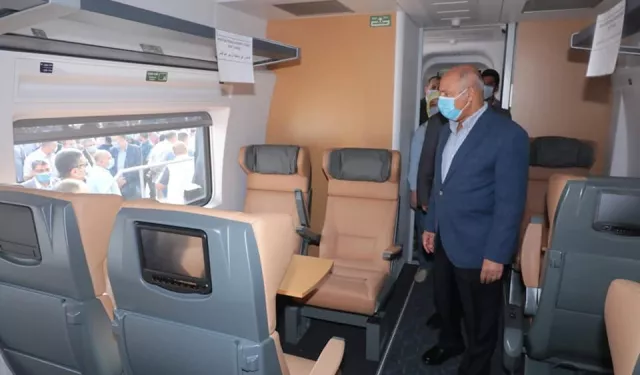
The Talgo train deal: Not quite out of love for the President
During a ride on one of Egypt’s new Talgo trains, Transport Minister Kamel Al-Wazir told TV host Ahmed Moussa that when the Spanish manufacturer signed a 2019 deal to supply six trains, it knocked $15m off the price “out of appreciation and love for the president.” It was an arresting remark in a business where profit, not affection, tends to drive discounts.The company’s own website,
however, lists a different price and different specifications than those cited by the minister.
Al-Wazir’s trip with Moussa on Jan. 22, 2023 from Cairo Central Station to Alexandria doubled as a moving exhibition of government achievements. Along the way he pointed to new roads, bridges and transport systems, comparing them proudly to those in Spain, America, and Germany.
The carriages were not empty. One passenger even suggested raising the fare, arguing that 200 pounds (about $4) for a first-class ticket was too little.
But once the minister’s journey ended, ours began: a fact-checking trip of a different sort.
Contradictory figures
Talgo put the value of the contract at 158 million euros. The minister, by contrast, cited $126m (around 112.5 million euros at the time), down from an original $141m (about 125 million euros).
Was the Spanish firm being disingenuous? Or why would it inflate the price—at least compared with the minister’s version of events? Those were the first questions in our own journey to reconcile the figures, and to see what the discrepancy might reveal about the overlap of business arithmetic and political storytelling in Egypt’s showcase rail deal.
We wrote to the company to ask about the discrepancy between its published price and the minister’s claim—and whether, as he suggested, a discount had been granted out of the chairman’s “appreciation” for Egypt’s president. The firm did not reply before publication.
A source at the Transport Ministry who was familiar with the deal at the time, however, offered part of the answer.
The source, who spoke to Al Manassa on condition of anonymity, said the value is exactly as the company recorded it: 158 million euros, broken down into 126 million euros for the trains, including two years of maintenance and spare parts, plus another 32 million euros for extending maintenance an additional six years. The extension was needed, the source said, because Egypt lacked the capacity to maintain Talgo trains. “So the full deal came to 158 million euros, covering eight years of maintenance, exactly as posted on the company’s website.”
In effect, the minister omitted a key component—extended maintenance—reducing the quoted cost to 126 million euros, the same figure he cited publicly, though in dollars.
What about the $15 million ‘discount’?
The source described the 2019 tender for six trains. Two firms bid—Talgo and Stadler—but Stadler withdrew on the day bids were opened. The railway authority was left with Talgo’s offer at 163 million euros.
A review committee made up of senior railway officials, a Finance Ministry representative, and a legal adviser, State Council Deputy Ahmed Elshazly, found the offer too high and sought a reduction. It recommended a reduction to the minister, who contacted the company. Talgo agreed to cut 5 million euros, not $15 million—bringing the signed contract to 158 million euros.
By contrast, the minister told Moussa that he spoke to “His Excellency the President, who asked me, ‘Can you do it?’—cut the price. I said I could. I called the company’s agent; he was in Paris for two days and told me he’d land at 9 pm. I said I’d wait until 10. He came, we sat down—he’s an honorable man. I told him, ‘Call the chairman of Talgo.’ He called the respected chairman, who told me twice, ‘I am not a broker.’ He said that twice, and he told His Excellency the President the same thing when we signed the sleeper-train deal later last year: ‘I am not a broker; I don’t know how to bargain. I own a company that makes the Ferrari of trains, the best in the world, and that’s why I stand by my prices and my specs.’”
That part of the minister’s account fits common business behavior. What followed did not: “I talked to him, and he sensed we were sincere, that we have a real development plan, that he would work with us later and manufacture here. He lowered the cost from the $141 million he wanted to the $126 million we wanted—out of love for Egypt and the Egyptian president, his desire to invest in Egypt, and his sense that these people are honest and want to work and develop.”
Did Talgo take a loss “for Egypt’s sake”?
At first glance, the minister’s remarks suggest Talgo’s chairman is partial to Egypt and willing to take a loss—or trim profits—“for love of Egypt and its president.” But the figures on Talgo’s site undercut any suggestion of a loss.
We reviewed the company’s other contracts. In Feb. 2020, about a year after Egypt’s deal, Talgo signed with Denmark for eight trains worth 500 million euros (about $560 million)—roughly three times the cost of Egypt’s deal. The higher price reflected more generous terms: lifetime warranty, a service life of 40 years, and top speed of 200 km/h.
We kept digging and found a 2019 deal with Germany whose details erase any suspicion of losses for love’s sake. The German contract was cheaper—yet with better specs.
That contract totaled 550 million euros for 23 trains—about 23.9 million euros per train (about $26.8 million). In Egypt’s deal, each train with maintenance is about 25 million euros (about $28 million).
Egypt’s trains top out at 160 km/h. Germany’s go 230 km/h and are designed not only for the German network but also for cross-border service in neighboring countries.
Under the German contract, Talgo would “design, build, and supply DB multi-voltage electric locomotives with a maximum operating speed of 230 km/h, fully compatible with different power and signaling systems.”
Speed isn’t the only difference, though it matters. The interior design and specs also diverge, showing that each buyer sets its own specifications.
German trains have step-free access, wheelchair-accessible toilets, Braille signage, adaptive lighting, and space for bicycles, strollers, and sports gear.
By contrast, Talgo highlights Egypt’s trains as resistant to heat, capable of operating above 50°C. “Passengers will travel in Egypt in maximum comfort thanks to high-performance air-conditioning equipment and special paint to protect from solar radiation,” the company says.
Climate policy also gets a nod. Reflecting the government’s climate focus at the time and Egypt’s preparations to host the climate summit in Sharm el-Sheikh at the time, Talgo added that the six units “support Egypt’s strategy to fight climate change.”
Taken together, these details suggest Egypt’s deal was far from a loss for the company, a concession on its part, or an act of affection.
Talgo’s chairman secured a profitable contract—along with the promise of another for sleeper trains, which the minister referenced when he said the chairman “will keep working with us, and will manufacture.”
The ministry source said this follow-on sleeper-train contract was why the company cut the initial offer from 163 million euros to 158 million.
Egypt signed a second contract in Aug. 2022 for seven sleeper trains, including 15 years of maintenance with service guarantees and supply of spare parts and equipment. While the ministry did not disclose the value, Talgo listed it as 280 million euros (about $314 million).
The seventh train
As Al-Wazir and Moussa neared the end of their Talgo ride, they went down a new track when their conversation turned to the seventh train. It wasn’t part of the contract, the minister said, but Talgo’s chairman decided to donate it to Egypt “out of appreciation for Egypt and the president.”
Once again, our source filled in the backstory.
Talgo missed its delivery schedule due to the pandemic. After negotiations, the company agreed to gift the train to “the Egyptian people” as compensation for the delay.
That train may not remain intact. The source expects it to be dismantled, so its first-class coaches can be used to increase capacity on other trains, given strong demand. That could explain the minister’s TV comment that first-class carriages would increase—without explaining how.
The source said the plan is to raise the number of first-class coaches per train from five to eight by reallocating cars from the spare train. “We’ll have to give up one train to distribute its cars across the rest.”
Whether the last train stays intact or its cars are redeployed, our journey ends with this: the discount was not $15 million but 5 million euros—and it wasn’t “for love of the president,” as the minister claimed, but in exchange for the sleeper-train deal.
The minister’s figures also excluded extended maintenance costs, leaving Talgo earning more per train in Egypt than in its German contract.
(*) A version of this article first appeared in Arabic on Jan. 26, 2023, updated on Feb. 10, 2023.




